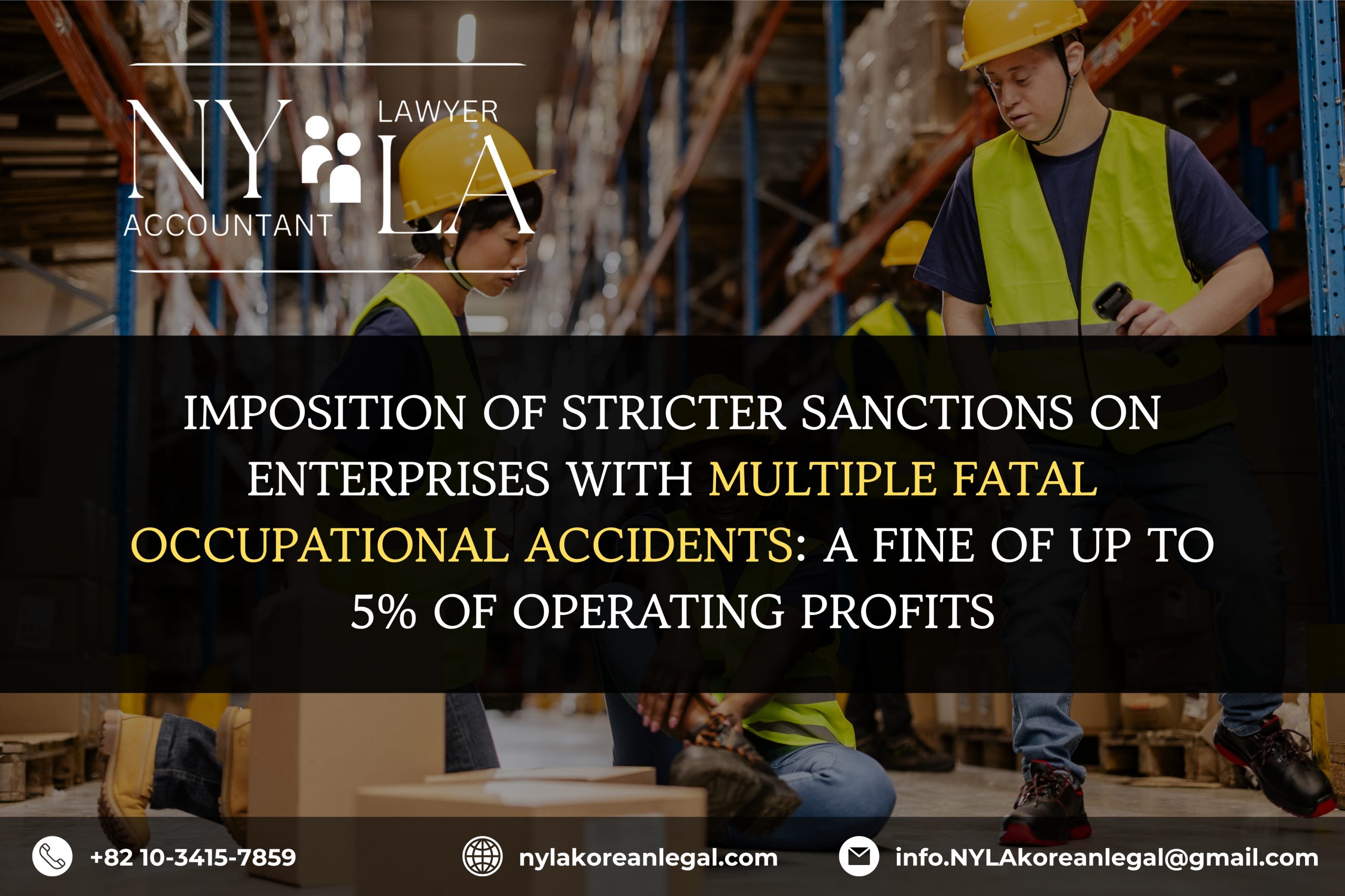In recent times, Korea has continuously recorded serious occupational accidents in the construction and heavy industry sectors, many of which have resulted in worker fatalities. In response to this situation, President of Korea, Lee Jae Myung, directed that all fatal accidents must be reported directly, while emphasizing that cost-cutting by neglecting safety measures in effect constitutes “a form of indirect murder”.
At the same time, the Government of Korea is considering tightening sanctions: ranging from disqualification from participation in construction bidding, encouragement of internal whistleblowing, to the imposition of financial measures compelling enterprises to increase investment in safety. In line with this trend, the proposal to impose fines of up to 5% of operating profits on enterprises with multiple fatal occupational accidents has attracted significant attention.
Summary
1. Contents of the proposed new sanctions
1.1. Applicable entities
- Enterprises operating in high-risk sectors, including construction, mining, metallurgy, chemical industry, and heavy industry.
- Cases resulting in death or permanent disability of workers.
1.2. Forms of sanctions
- Financial penalty: Up to 5% of operating profits in the most recent fiscal year. For example, in the case of a construction company with operating profits of KRW 1 trillion, the fine may amount to as much as KRW 50 billion in the event of a violation — a figure sufficiently substantial to exert pressure on the enterprise to implement necessary changes.
- Supplementary measures:
- Prohibition from participating in public procurement projects, either for a specified period or permanently.
- Suspension or revocation of business licenses in cases of repeated violations.
- Criminal liability of the management in cases of negligence or intentional reduction of safety measures.
1.3. Reporting and monitoring mechanism
- Mandatory reporting: All fatal accidents shall be reported immediately to the central regulatory authority; concealment of such incidents by enterprises shall not be permitted.
- Independent oversight: A specialized agency shall be established to investigate and disclose relevant data, thereby enabling monitoring by the public, the press, and civil society organizations.
- Whistleblowing incentives: A mechanism shall be enacted to protect internal whistleblowers, accompanied by substantial financial rewards for individuals who identify and report construction projects posing safety risks.
2. Legal basis and constitutionality
For these sanctions to be applied, amendments or supplements are required in:
- Occupational Safety and Health Act, which clearly stipulates the responsibilities of enterprises in protecting the lives of workers.
- Corporate Liability Act, which expands the authority to impose financial penalties based on profits, similar to the sanctioning provisions in the fields of antitrust or environmental protection.
Certain issues that need to be clearly defined to avoid legal disputes:
- Which accounting standard shall be used to calculate “operating profits” (pre-tax or post-tax).
- The specific criteria for determining what constitutes “multiple fatal accidents”; for example, two or more incidents within a year, or a fatality rate exceeding a certain threshold relative to the workforce size.
- The principles for distinguishing liability between the main contractor and subcontractors, to ensure fairness.

3. Benefits and practical significance
- Enhancing deterrence: When the cost of violations is prohibitively high, enterprises are compelled to prioritize safety rather than disregard workers’ lives.
- Protecting workers: Reducing the risk of fatalities and serious injuries, thereby safeguarding fundamental human rights in the workplace.
- Promoting fairness in business: Enterprises that invest seriously in safety will not be disadvantaged compared to those that cut safety-related costs.
- Strengthening national reputation: A safe working environment reinforces public trust and creates a competitive advantage in attracting foreign investment.
4. Difficulties and challenges
- Enforceability:Competent authorities must have sufficient resources to investigate and establish corporate liability.
- Economic impact: Small and medium-sized enterprises may bear financial burdens, necessitating the design of accompanying support mechanisms.
- Proportionality: Care must be taken to avoid excessively severe sanctions that could lead to business insolvency and widespread job losses.
5. Conclusion
The imposition of fines of up to 5% of operating profits on enterprises responsible for multiple fatal occupational accidents represents a significant step forward. This is not merely a financial penalty but also a strong reminder that human life cannot be sacrificed for profit.
To ensure effective implementation, it is necessary to:
- Establish a clear and transparent legal framework.
- Set up an independent monitoring system.
- Combine multiple measures, including financial penalties, administrative actions, and, where necessary, criminal prosecution.
Through these measures, Korea can minimize occupational accidents, protect workers’ rights, and simultaneously establish a safe, fair, and sustainable business environment.
6. About NYLA – Korean Legal Office

■ NYLA – Your Trusted Legal Partner in Korea
At NYLA, we understand that the success of foreign businesses in Korea requires not only a solid business strategy but also reliable legal support. With a team of experienced Korean attorneys and legal professionals, NYLA provides tailored legal services for companies, investors, and individuals operating or planning to establish a presence in Korea.
We support our clients throughout the entire business journey with comprehensive services, including:
- Legal consultation on company establishment, taxation, and immigration;
- Advice on commercial real estate, franchising, and product distribution;
- Support in human resources, marketing, and business strategy.
In addition to legal advisory, NYLA also represents clients in civil litigation cases related to business, labor, marriage, family, and inheritance to ensure their rights and interests are fully protected.
■ Contact NYLA

If you’re a foreign business or individual looking for a reliable legal partner in Korea, NYLA is here to help. We are committed to delivering effective, practical, and personalized legal solutions for every client.
With a proven track record of assisting hundreds of international clients, our team is equipped to help you navigate complex legal challenges—whether it’s commercial disputes, contract issues, or foreign investment guidance.
Don’t let legal matters hold you back. Let NYLA be your trusted guide in the Korean market.
■ Get in touch with NYLA for expert legal support
| Website: https://nylakoreanlegal.com/
FB: https://www.facebook.com/nyla.koreanlegal Tiktok: https://www.tiktok.com/@nylakoreanlegal Youtube: https://www.youtube.com/@NYLA-xd8qx Email: info.NYLAkoreanlegal@gmail.com SĐT: +82 10-3415-7859 |
 |






















































